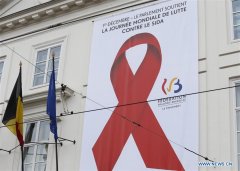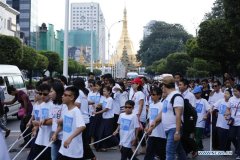Spotlight: Cuban medical brigade awarded int'l prize for Ebola fight
by Raul Menchaca
HAVANA, May 28 (Xinhua) -- If any one person can embody Cuba's efforts to improve healthcare around the world, it is Dr. Felix Baez Sarria, who contracted and overcame the deadly Ebola virus to help lead the global fight against the scourge.
As part of Cuba's Henry Reeve International Medical Brigade, which was at the frontlines of the Ebola fight in West Africa in 2014, Baez received the 2017 Dr. Lee Jong-wook Memorial Prize for Public Health, during a ceremony at the World Health Organization (WHO) headquarters in Geneva, Switzerland earlier this week.
Baez, a specialist in internal medicine, was part of the first contingent of the brigade to be posted to Sierra Leone, where he contracted the virus a month later, in November 2014. He was evacuated to Switzerland, and treated at a Geneva University Hospital, where, he said, "they saved my life."
"I was humbled and enriched by my whole experience, both as a professional and as an individual. I am much more sensitive to the risks facing our patients -- the possibility of death in such situations, and the need to die with dignity," he said.
"My attitude to the disease also changed -- Ebola is not a death sentence. With a rapid response, confidence in the protocols and in our equipment, Ebola can be beaten," Baez said.
Once recovered, Baez returned to Sierra Leone in January 2015 to continue his mission.
That dedication, more than anything, reflects the philosophy of Cuba's medical missions and merits the award, which according to the WHO is presented to individuals or groups, governmental or otherwise, "who have made an outstanding contribution to public health and extended far beyond the call of normal duties."
"For the Henry Reeve Medical Brigade, the award ... is an invaluable recognition of our work and an incentive to continue to extend our solidarity and assistance to all people facing emergencies or natural disasters," said Baez.
Cuba's Health Minister Roberto Morales was also on hand to receive the recognition, which comes with a 100,000 U.S.-dollar prize.
Cuba's history of health cooperation dates as far back as 1960, when its then leader Fidel Castro dispatched doctors and nurses "trained in disaster medicine and infectious diseases containment" to Chile following a catastrophic earthquake, said the WHO.
The Cuban brigades have attended to more than 3.5 million people in 21 countries around the globe, including in Latin America and Asia.
The more than 7,400 Cuban healthcare workers who volunteer in the brigades have faced some of the worst natural disasters and epidemics of the past 10 years, with the WHO estimating they have saved some 80,000 lives.
Castro was moved to create the Henry Reeve emergency response contingent following the devastation of Hurricane Katrina, which destroyed much of the U.S. city of New Orleans in August 2005, killing more than 1,800 residents.
The brigade was named after a young U.S. doctor who died in the 19th century fighting for Cuba's independence from Spanish colonial rule.
Castro offered to send the brigade to help the victims of Katrina, but the then U.S. president George W. Bush refused the offer.
Later that same year, in October, 688 brigade volunteers headed to flood-ravaged Guatemala, and just weeks later, the brigade was sent to Pakistan, after a powerful 7.6-magnitude earthquake killed 70,000 people and injured over 100,000.
Since then, the brigade has consistently aided victims of natural disasters, including the 2015 Nepal quake and 2016 Hurricane Matthew in Haiti.
To date, the brigade's biggest challenge has been the fight to contain the Ebola epidemic in Guinea, Sierra Leone and Liberia, saving some 7,000 lives.
Today, more than 40,000 Cuban doctors and nurses are working to improve healthcare in 62 countries, and the Henry Reeve Brigade stands ready to attend to the victims of any natural disaster or serious epidemic.















